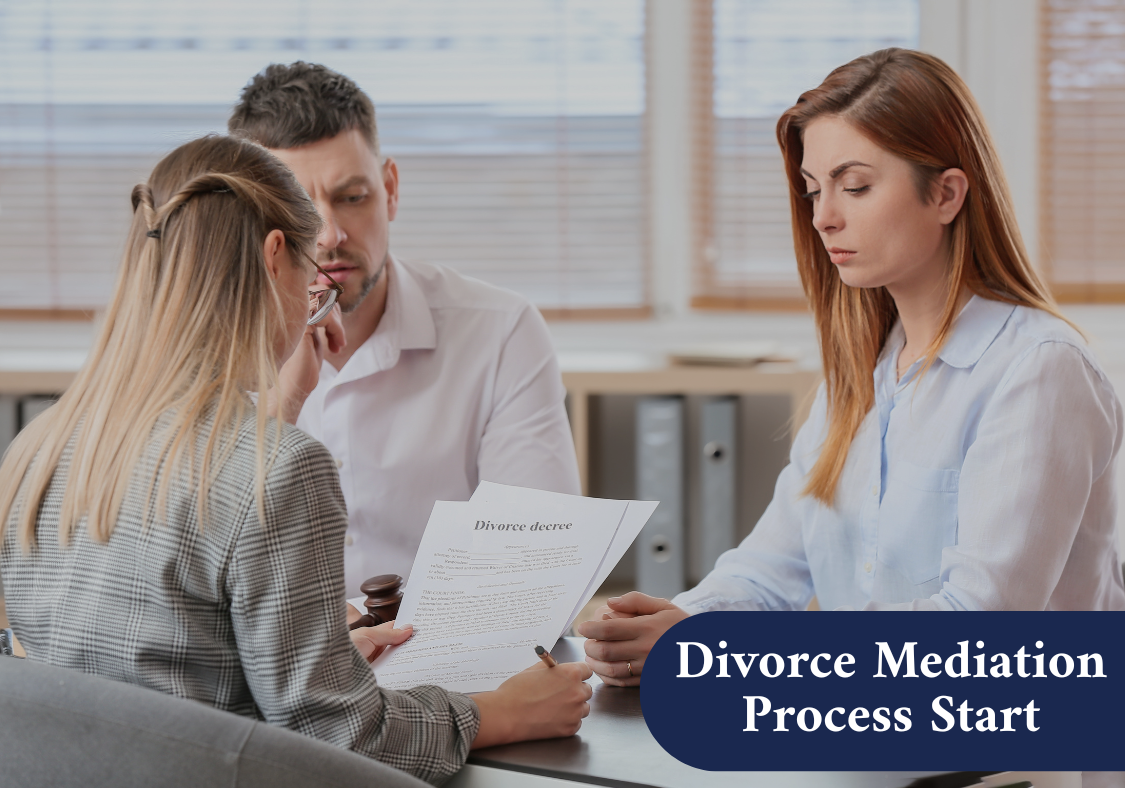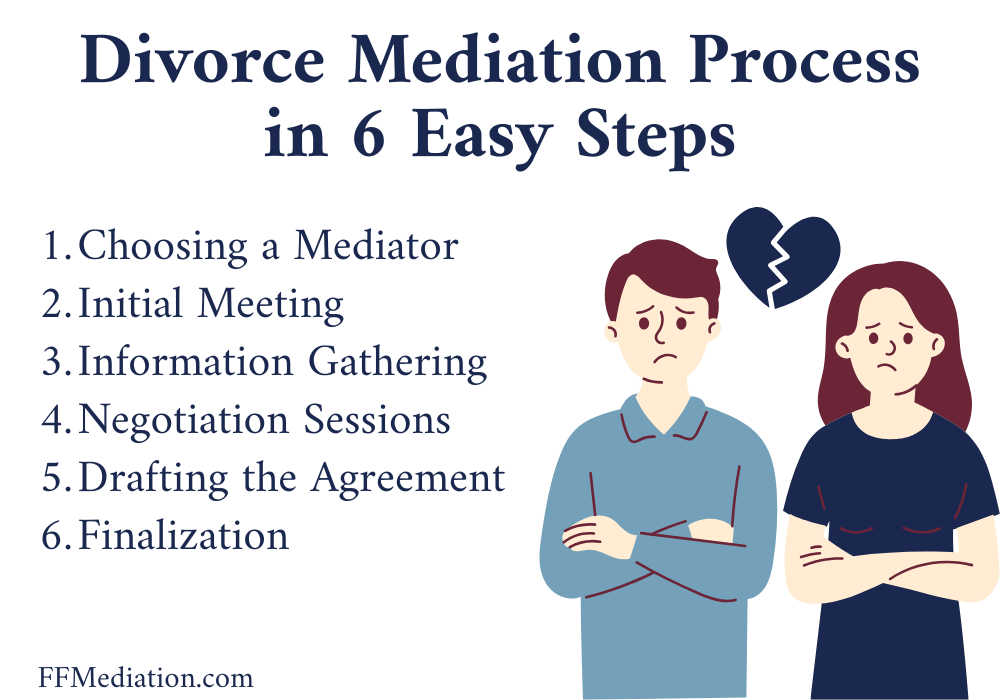Providing Divorce Mediation Services Throughout California
Providing Divorce Mediation Services Throughout California
You may have heard of divorce mediation from a friend TV, or the San Jose community.

Reach out to find the best solution for your divorce with trusted professionals.
Divorce mediation process in California may be more attractive because it has a shorter time commitment, it is often less expensive, and there is less stress compared to fighting in court (divorce litigation).
Most importantly it lets you and your ex-spouse decide the outcome together rather than leaving that up to a judge. At Families First Mediation, we as divorce attorney-mediators guide couples towards making a peaceful resolution under the leadership of Dina Haddad.
Ms. Haddad is a seasoned family law attorney and mediator and she helps California couples reach a fair agreement without conflict or malice. Book a FREE Divorce Mediation Consult with Dina Haddad to ask questions about divorce mediation process or starting your mediation.
In simple words, divorce mediation in California is a non-confrontational means for couples to settle their differences without taking a case through the court process. Divorce mediation consists of a neutral mediator whose role is to help couples clarify points of differences and agree with respect to custody and support for children, and division of property.
Dina Haddad is one of the top divorce mediators in California whose help has guided hundreds of clients through the mediation process to an agreeable resolution that works for couples.
Mediation offers an opposite scenario to divorce litigation and DIY divorce by encouraging cooperation. With mediation, the couple has greater control of the divorce by creating and adhering to terms, rather than handing decisions over to the court.
Collaboration divorce may be better financially and legally, but it is more complex since it will have more professionals involved. Divorce mediation is somewhere in the middle; it is uncomplicated and efficient, yet still considers the couple’s needs.
Divorce mediation is effective for couples who fall under the following categories:
However, mediation may not be suitable in some cases. Here are those and you need to consider them before starting divorce mediation:

The mediation process you go through entirely depends on your situation, for example, a couple with children will have sessions focused on child custody arrangements, while those with complex assets will prioritize asset division. But for most cases, they often follow these steps:
The first step in a successful divorce is selecting the right divorce mediator. You should do research to find someone who is competent, friendly, knowledgeable about the process and everything it entails, someone like Dina Haddad, who provides customized mediation services.
The next part is to meet the mediator and talk about your objectives, worries regarding the system, and the mediation plan. You will have to plan a bit in advance, for example, in collecting some documents and identifying your priorities. Generally the meeting will last for 2 hours.
At this point, both sides gather information such as financial statements, property titles, and other relevant documents, which aids in the negotiation process. Dina monitors the process closely to help participants avoid delays.
In this phase, all the discussions take place and the couple identifies the terms for child custody, asset division (property) and support (money), agreeing on terms as part of their resolution. Each mediation session may have both parties together or separated, depending on level of complexity. That said, it is best practice to have both parties appear together for mediation.
After the couples have completed their negotiations, the mediator will then prepare all the agreements reached into a document called a Marital Settlement Agreement. This document will contain their wishes on issues such as child and spousal support payments, custody, and property division.
Before submitting the agreement to the court for filing, Dina and her staff at Families First Mediation will double check that all documents are accurately completed and submitted within deadlines so that nothing holds up the couples at this stage.
Related: How Long Does Divorce Mediation Take in California? The Guide for Time Savers
When the mediation session is complete and both participants are satisfied with the outcome, the resulting settlement is filed in court. Unlike traditional litigation, court approvals typically go through much faster; however, they do depend on the court’s schedule.
In cases where mediation does not succeed, alternative dispute resolution is always possible. If needed, couples can even resort to litigation. However, mediation failing could reveal some areas that need more work, which can allow for a fresh mediation approach with an expert mediator like Dina Haddad.
To avoid complications during post-mediation, Dina provides a few resources, like a 90-item Divorce Mediation Checklist and Divorce Mediation Preparation Guide and 15 Divorce Mediation Tips to help couples brace themselves and avoid issues during the divorce.
Divorce takes a lot of work to gain closure. Even with mediation, legal help is still needed to come to an agreement that is neutral and legal. Book a FREE Consult with Dina Haddad to see how her expertise can assist you through mediation!
Unlike traditional divorce litigation, mediation takes less time and is far less stressful. While traditional court sessions can take months and even years to finalize, mediation can be concluded in a few weeks.
After the mediation process is done, the mediator will take the agreement to court, where the judge will make the terms a binding legal order for both parties to follow. After some time, usually after the six-month mandatory waiting period, you can check if your divorce is final.
Divorce mediation is one of the most beneficial methods for going about divorce and is much less expensive than litigation. In California, mediation can range in cost from $5,000 to $15,000 whereas hiring an attorney can be anywhere from $30,000 to over $100,000.
This high expense from litigation is because cases are drawn out, costing legal fees, filing fees, and more. Affairs, but in the end, mediation focuses on limiting expenses and enhancing quality.
On the other hand, mediation is ideal because expenses are shared between couples, which would otherwise be very difficult in litigation. This shared financial responsibility makes mediation a practical choice for many. Schedule a free consultation with Dina Haddad to learn more about mediation costs and benefits.
Learn More: Whooping Divorce Cost in California, Excluding This Cheaper Option.
Couples have the option of participating in mediation online, or meeting in person, both will have advantages. The convenience of online mediation comes to those couples who can have sessions from their home, which is beneficial for busy professionals and long-distance couples.
The technology requirement is minimal – a good internet connection, video conferencing capability. Dina Haddad also has the ability to provide online mediation sessions, as she has with in-person mediation sessions.
In contrast, in-person mediation sessions involve talking to each other face to face, potentially advantageous for couples that want a more personal element. While all methods strive for peaceful outcomes, in 2025 even more people will consider online mediation as an option due to its ease and expediency.
Pro Tip: Check your tech setup prior to your meeting to prevent disruption and enhance communication. Explore both online and in-person options—schedule a Free Consult with Dina Haddad to find the best fit for your needs.
Divorce mediation with a narcissist can be difficult, but surely doable. With some preparation and the aid of a strong mediator (like Dina Haddad), you can get it right. Below are some tips for dealing with a narcissistic partner during divorce mediation:
Divorce mediation is designed to be faster, less costly, and more effective than divorce litigation. Dina Haddad aims to provide a solution for couples in California to access mediation at an affordable price.
With her experience and expertise, she can help the parties to ensure the mediated agreement is fair, and both parties’ needs are addressed regarding custody, division of property and spousal or child support. Want to take a less adversarial path for your divorce in California? Contact our expert mediator to schedule a FREE Consult.
Everyone should be cooperative and respectful during mediation. Do not blame anyone or broach another entirely separate issue from the past. Using phrases like, “You always…” or “You never…” will only frustrate and reverse progress made in mediation. Think about how to collaborate in the now and future and develop solutions to the issues that everyone can agree to.
Although mediation is an excellent divorce method, it can be ineffective when there is distrust, dishonesty, or refusal to compromise. A mediator has no authority to make a decision because it has to be decided by everyone involved.
The success rate for divorce mediation is quite high as studies show that about 70-80% reach an agreement. With Dina Haddad’s approach, it’s even better because she makes sure that the mediation process remains fair and focused on the couple’s unique needs.